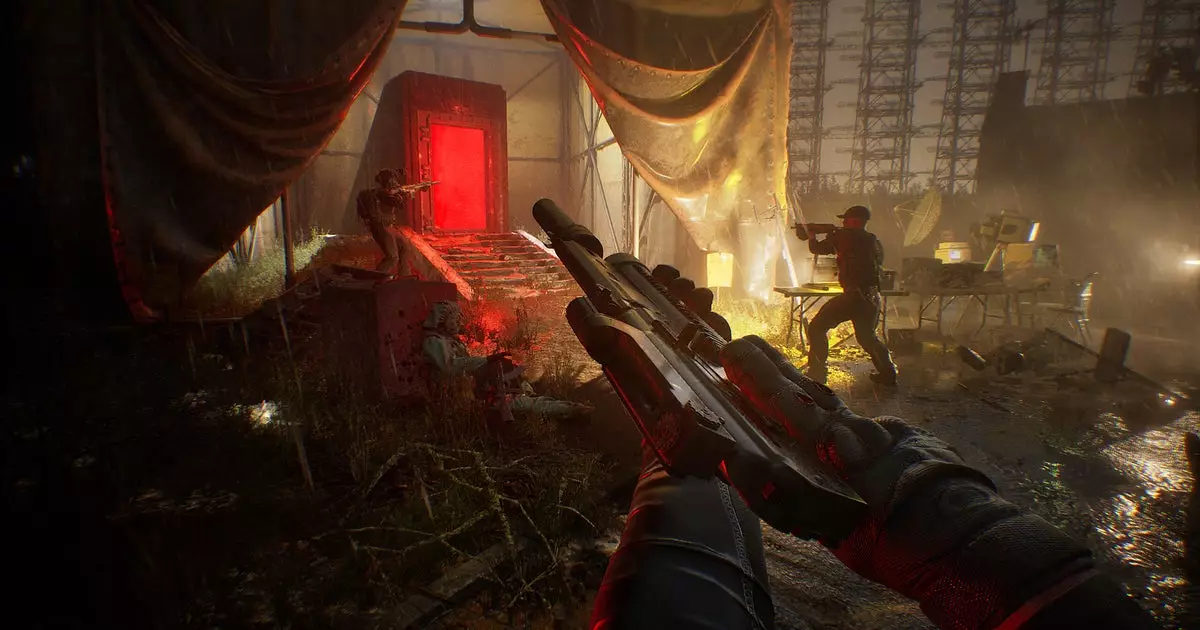In the evolving landscape of video games, “Phantom Line” stands out as a uniquely ambitious project that merges open-world mechanics with chilling horror elements. Set against a backdrop of a cataclysmic paranormal crisis, the game’s narrative shifts focus from humanity’s typical existential threat—nuclear war—to the more unimaginable horrors lurking beneath the surface. This dramatic pivot away from conventional apocalyptic themes sets the stage for a truly grotesque and engaging experience.
“Phantom Line” creatively integrates themes from Lynchian surrealism and Tarkovskian metaphysical exploration, resulting in a gaming atmosphere dense with existential dread and otherworldly encounters. While many games default to nuclear war as their dramatic backdrop, this title thrusts players into a realm where demonic puppets roam amid a labyrinthine environment filled with crimson drapes. The primary threat shifts from geopolitical tensions to an uncanny confrontation with the unknown, reflecting a broader trend in contemporary gaming where horror surpasses traditional cataclysmic events in narrative urgency.
Players can find themselves yearning for the simplicity of a nuclear fallout rather than encountering the grotesque terrors that the game offers. The narrative is not merely about survival; it forces players to grapple with existential consequences and the transformation into something profoundly abominable—an experience that redefines what it means to be human within the game’s context.
One of the standout features in “Phantom Line” is the HUSK system, which allows players to switch between squad members during combat. This dynamic gameplay element empowers gamers to adapt their strategies in real-time, making for a fluid combat experience. While such a system might seem straightforward, its implications on gameplay and collaboration are profound. The idea of controlling synthetic bodies (HUSKs) opens up avenues for strategic depth and player creativity.
As players engage in solo missions, they can command their HUSKs to act as decoys or scouts, filling roles that traditional gaming partners might neglect. This autonomy not only enhances the tactical layer of the game but also embraces the notion of cooperation in a rather unconventional manner. The game cleverly sidesteps potential frustrations of multiplayer interactions by allowing players to master team dynamics without the burden of relying solely on human partners.
Phantom Line’s environmental storytelling is richly layered, offering diverse locales that players can explore as they navigate through twisting paths toward their objectives—like the Black Forest Research Facility. Each location is more than just a setting; it is a narrative device that feeds into the game’s larger thematic concerns of exploration, survival, and transformation. Through engaging with dynamic events and customization options for gear, players can deeply immerse themselves in the chaotic world of “Phantom Line.”
This open-world design encourages discovery and experimentation, fostering a sense of agency in how players choose to tackle challenges. The combination of thrilling exploration with strategic survival elements mirrors the very essence of transformative horror.
The narrative takes on a profound depth when it intertwines the idea of losing one’s humanity to combat the very horrors that threaten it. Players must confront the morally gray area of becoming the monster they fight against. With augmentations using “exotic elements,” the game poses a compelling philosophical question: At what point does fighting evil require embracing it? This exploration of duality adds a psychological layer that resonates deeply with players on both emotional and cognitive levels.
Additionally, the game promotes a form of introspection about personal agency, highlighting how desperation can drive individuals to unthinkable choices. This narrative depth elevates “Phantom Line” beyond mere survival horror, evolving it into a thought-provoking experience that questions the very fabric of morality in a chaotic universe.
“Phantom Line” stands as a bold new chapter in horror gaming, blending open-world mechanics with a rich narrative steeped in philosophical inquiry. The innovative HUSK system transforms gameplay dynamics while the eerie atmosphere pulls players into a haunting world of transformation and existential dread. As players navigate this unique landscape, they are not merely surviving; they are continually making choices that define and challenge their very humanity. With its blend of traditional gaming elements and deep thematic content, “Phantom Line” promises a haunting yet reflective experience that deserves keen attention from the gaming community.

